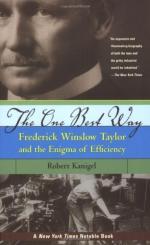|
This section contains 1,696 words (approx. 6 pages at 300 words per page) |

|
SOURCE: "Faster Mousetrap," in The New York Times Book Review, June 15, 1997, p. 10.
In the following essay, Will reviews The One Best Way: Frederick Winslow Taylor and the Enigma of Efficiency.
In November 1910 some railroads were trying to prove, as it had recently become their burden to do, that they merited Federal permission for rate increases. Representing opponents was Louis Brandeis, the future Justice, who questioned railroad officials about their costs. Were new efficiencies in operations an alternative to rate increases? No, said the railroaders. How did they know? Brandeis asked. Trust us, they said.
But Brandeis was in no mood to trust people who trusted their hunches, intuitions and experiences rather than the rising clerisy of experts. He caused a sensation by asserting that the railroads could save $ 1 million a day—serious money then—by "scientific management." How did he know? He knew about Frederick Winslow Taylor, who...
|
This section contains 1,696 words (approx. 6 pages at 300 words per page) |

|


